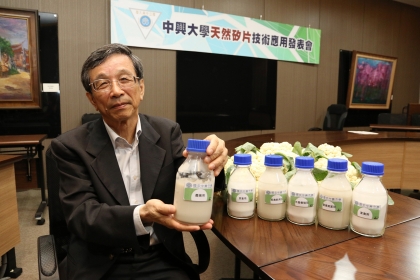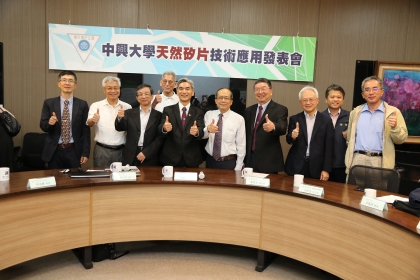Natural Silicate Platelets (NSP) developed by NCHU brings a new opportunity for agriculture, livestock breeding and fishery
2019-03-21
興新聞張貼者
Unit秘書室
2,783
The research team of National Chung Hsing Universtiy (NCHU) led by Visiting Professor Jiang-Jen Lin of Department of Materials Science and Engineering has successfully developed “Natural Silicate Platelets (NSP)” which is a new type of non-toxic and antibacterial material enabling to inhibit the spread of bacteria and viruses by means of its “Physical Capture” mechanism. Being widely used in agriculture, livestock breeding and fishery, NSP brings Taiwan a new opportunity for economic development. In the morning of March 21st NCHU announced the academic findings on NSP new technology and applications.
16-year research and field trials bring up the NSP technology for wide applications in industries
In 2003 during SARS spreading, Professor Lin for the first time announced “Nano Silicate Platelets” isolation as the new material from the extraction of natural ore through refining processes. It could effectively resist SARS virus. In 2009 during H1N1 spreading this material was further developed into “Silicate Silver Bullet 900”. On the basis of the research team’s ceaseless efforts for a number of years, “Nano Silicate Platelets” evolved into the new-generation “Natural Silicate Platelets” to be a product fully friendly to soil, water and ecological environment and friendly for being large-scale used in natural land.
After field test with this NSP technology for more than 10 years, this product has been adopted by Council of Agriculture as a plant protection material exempted from registration. It further links up with the Government’s 5+2 Industrial Innovation Plan and New Southbound Policy in New Agriculture category. The ultimate goal is to spread this technology worldwide so as to solve the problems of food safety and food scarcity.
NSP in agriculture (a “zero-insecticide” farming method, being friendly to soil and environment)
The large-scale experiments with 30 more kinds of crops over the past decade has demonstrated that NSP is an ideal substitute for “chemical” insecticide to inhibit the diseases which may be arising from spreading of bacteria (such as Panama disease, rust disease, anthrax, black rot, etc.) Consequently, NSP can effectively promote healthy growth of plants, enhance quality of vegetables and fruits, and boost crop yield.
The NSP technology: A large scale of paddy rice field test has produced 486 tons of polished rice without any insecticide being ever used in the whole test. No insecticide residues or heavy metals were detected in harvested crops. Food safety was fully ensured. NSP can lead the bacterial breeding to a good-quality bacterial flora balance in soil, and considerably solve the problems involved in soil restoration such as soil acidification, fallow and rotation tillage. NSP intensifies healthy physiology and promotes growth of the plant. Thus, the average yield is increased by 20% or more. Accordingly, mitigation of global food crisis is expected on the ground of NSP application.
Specific functions of NSP: 1. an ideal substitute for insecticide; 2. increase in agricultural productivity, and quality optimization; 3. soil restoration.
NSP used in livestock breeding (“zero-antibiotics” to inhibit bird flu)
By means of its “Physical Capture” mechanism, NSP is able to inhibit the spread of viruses and prevent bird flu. The test results show the effectiveness of NSP in improving the digestive tract of duckling, reducing lethality and boosting adult duck’s immunity system. In case of combination with prescription technology, NSP can serve as an environmental disinfectant to avoid pathogen’s cross infection.
The unique characters and future outlook of NSP
1. NSP subverts traditional method: NSP is a new material which inhibits the spread of bacteria and viruses by means of its “Physical Capture” mechanism. The granted patent on NSP has been cited in more than 20 patent articles so the intellectual property rights with respect to NSP are largely protected. Multiple applications of NSP, for instance, in agriculture, livestock breeding, soil and environmental water quality, have been developed by and under cooperation of 10 professors from different expertise.
2. NSP has been adopted by Council of Agriculture as a plant protection material exempted from registration. NSP coordinates with the Government’s 5+2 new agricultural and southbound policies and will be promoted worldwide so as to solve the global problems such as the issues in food safety, food crisis, soil restoration, water resources protection, etc.
The prospective “Silicate Platelet Silver”, an antiseptic material: The medical applications are in progress, including skin dressing, ointments, new nanocarriers and targeted cancer therapies. The final objective is the international market and a series of U.S. FDA approved products, through international collaboration.
16-year research and field trials bring up the NSP technology for wide applications in industries
In 2003 during SARS spreading, Professor Lin for the first time announced “Nano Silicate Platelets” isolation as the new material from the extraction of natural ore through refining processes. It could effectively resist SARS virus. In 2009 during H1N1 spreading this material was further developed into “Silicate Silver Bullet 900”. On the basis of the research team’s ceaseless efforts for a number of years, “Nano Silicate Platelets” evolved into the new-generation “Natural Silicate Platelets” to be a product fully friendly to soil, water and ecological environment and friendly for being large-scale used in natural land.
After field test with this NSP technology for more than 10 years, this product has been adopted by Council of Agriculture as a plant protection material exempted from registration. It further links up with the Government’s 5+2 Industrial Innovation Plan and New Southbound Policy in New Agriculture category. The ultimate goal is to spread this technology worldwide so as to solve the problems of food safety and food scarcity.
NSP in agriculture (a “zero-insecticide” farming method, being friendly to soil and environment)
The large-scale experiments with 30 more kinds of crops over the past decade has demonstrated that NSP is an ideal substitute for “chemical” insecticide to inhibit the diseases which may be arising from spreading of bacteria (such as Panama disease, rust disease, anthrax, black rot, etc.) Consequently, NSP can effectively promote healthy growth of plants, enhance quality of vegetables and fruits, and boost crop yield.
The NSP technology: A large scale of paddy rice field test has produced 486 tons of polished rice without any insecticide being ever used in the whole test. No insecticide residues or heavy metals were detected in harvested crops. Food safety was fully ensured. NSP can lead the bacterial breeding to a good-quality bacterial flora balance in soil, and considerably solve the problems involved in soil restoration such as soil acidification, fallow and rotation tillage. NSP intensifies healthy physiology and promotes growth of the plant. Thus, the average yield is increased by 20% or more. Accordingly, mitigation of global food crisis is expected on the ground of NSP application.
Specific functions of NSP: 1. an ideal substitute for insecticide; 2. increase in agricultural productivity, and quality optimization; 3. soil restoration.
NSP used in livestock breeding (“zero-antibiotics” to inhibit bird flu)
By means of its “Physical Capture” mechanism, NSP is able to inhibit the spread of viruses and prevent bird flu. The test results show the effectiveness of NSP in improving the digestive tract of duckling, reducing lethality and boosting adult duck’s immunity system. In case of combination with prescription technology, NSP can serve as an environmental disinfectant to avoid pathogen’s cross infection.
The unique characters and future outlook of NSP
1. NSP subverts traditional method: NSP is a new material which inhibits the spread of bacteria and viruses by means of its “Physical Capture” mechanism. The granted patent on NSP has been cited in more than 20 patent articles so the intellectual property rights with respect to NSP are largely protected. Multiple applications of NSP, for instance, in agriculture, livestock breeding, soil and environmental water quality, have been developed by and under cooperation of 10 professors from different expertise.
2. NSP has been adopted by Council of Agriculture as a plant protection material exempted from registration. NSP coordinates with the Government’s 5+2 new agricultural and southbound policies and will be promoted worldwide so as to solve the global problems such as the issues in food safety, food crisis, soil restoration, water resources protection, etc.
The prospective “Silicate Platelet Silver”, an antiseptic material: The medical applications are in progress, including skin dressing, ointments, new nanocarriers and targeted cancer therapies. The final objective is the international market and a series of U.S. FDA approved products, through international collaboration.



